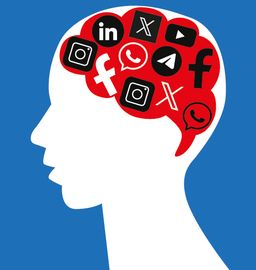Parents don’t need research. They know when their children get addicted to social media. Just like wives know when husbands become alcoholics or fathers know when sons’ clandestine smoking turns into addiction. But research is necessary if household misery is to be addressed by impactful public policy.
New American research establishes what most parents know from experience—social media harms children. In his just-published book, The Anxious Generation, renowned New Yorker and social-psychologist Jonathan Haidt writes, “When adolescents’ social lives moved onto smartphones and social media platforms, anxiety and depression surged among them.”
The turning point came in 2012, Haidt says, when social media went viral, after Facebook bought Instagram and with the arrival of high-speed internet, unlimited data and smartphones with front-facing cameras. Schoolgirls spent hours daily taking selfies, editing and posting them for buddies, rivals and strangers to comment on. Simultaneously they scrolled for the posts of friends, foes and celebrities flaunting their wealth, perfect bodies and luxurious lifestyles. Time spent on social media eroded sleep, study and activities with family and friends. Academic performance in reading and math deteriorated. Negative emotions like anger, envy, shame and sadness spiraled. Self-harm increased among pre-teens and teenagers.
Gen Z (born after 1996) suffered like no previous generation, although millennials (born 1981-1996) haven’t been spared. Over the decade, American youth suicide rose by 130 per cent.
Haidt emphasises two of the six factors contributing to this mental health crisis. First, “play-based childhood” declined because anxious parents didn’t send children for unsupervised outdoor play—which helps overcome normal childhood fears, judge risks for themselves and thus prepare for adulthood. Overanxious parents birthed an anxious generation. Second, “play-based” was replaced by “phone-based childhood”. This diminished in-person socialising. Haidt argued social media “hacked” and “rewired” children’s brains, but scientists lacked data hitherto to protect children from tech companies. “We ended up overprotecting children in the real world, while under-protecting them in the virtual world,” he says.
The addictive nature of social media is the problem. Tech investor Roger McNamee says “to encourage addiction, tech companies use techniques common in propaganda and casino gambling”—constant notifications (likes) and variable rewards (for accomplishment/novelty-seeking behaviour). Mental health is as important as physical health. So, should the production and consumption of social media be restricted like alcohol and cigarettes? Together with some leading tech founders, Haidt pleads for phone-free schools, age-guards, student digital guidance and social media regulation. Says McNamee, “Now we face the challenge of extracting the world from the jaws of internet platform monopolies.”
But Haidt has vocal detractors. Journalist Aaron Brown called Haidt’s findings “mostly junk research”. Haidt’s critics quote studies claiming social media is about as harmful as eating potatoes—almost zero. As Mark Twain says, “There are lies, damned lies and statistics.”
For decades the tobacco lobbyists debunked evidence that smoking caused cancer. For decades, the oil lobby scorned climate change. Salt, sugar, junk food and pharma lobbies followed. And for decades, lobbyists supplied spurious statistics to confuse the public and delay, if not abort regulation.
Haidt says, “The correlation between social media and mental health is higher than the correlation between childhood exposure to lead and low adult IQ. The proper comparison is not potatoes, but marijuana use and binge drinking.” McNamee, who mentored Facebook founder Mark Zuckerberg, says, “It is time to disrupt the disrupters.”
Pratap is an author and journalist.


